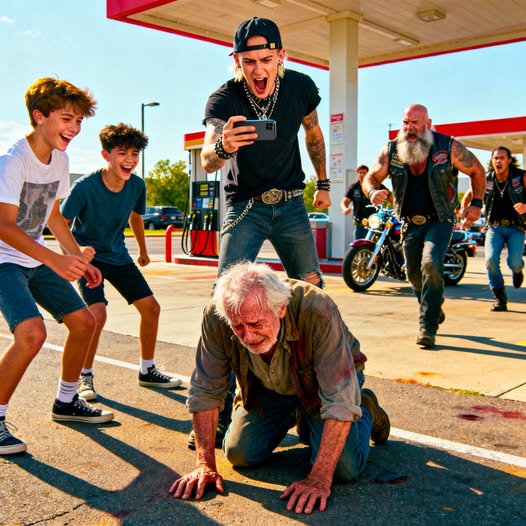I was filling up my tank at the Stop-N-Go on Highway 49 when I heard it—the sharp crack of palm against skin followed by the clatter of something small and plastic bouncing across the pavement. When I turned, I saw Harold Wiseman, 81 years old, Korean War veteran and Purple Heart recipient, on his knees with blood running from his nose.

Standing over him was a kid no older than 25, face tattoos, backwards cap, pants sagging, filming the whole thing on his phone while his buddies laughed. “Should’ve minded your business, old man,” he sneered, zooming in on Harold. “You’re about to be famous, grandpa.” What Harold had actually done was ask them to move their car out of the handicapped space so he could park closer with his oxygen tank. What the punk didn’t know was that 47 members of the Savage Riders Motorcycle Club were inside that gas station for our monthly meeting. My name’s Dennis “Tank” Morrison, president of the Riders, and as soon as I saw Harold on the ground searching for his hearing aid, I told my brothers we had a situation.
Harold wasn’t just anyone—he was the kind of man who’d spent forty years fixing cars at the Ford dealership, often for free if the customer was a single mom or a struggling neighbor. Every Thursday at 2 p.m., since his wife Mary passed, he bought a coffee with two sugars and a lottery ticket at that very store. He was a fixture in town, respected and loved. Seeing him bleeding while three punks filmed for internet clout lit a fire in all of us. We rose as one, 47 men scraping back chairs, and walked out of that store in formation. The punk was still taunting Harold when my shadow fell over him.
He looked up from his phone to find himself surrounded by a wall of leather and denim. He tried to spin it, calling Harold racist, but I shut him down by reminding everyone that Harold was the man who paid for Jerome Washington’s funeral and taught countless kids of all backgrounds to fix cars. Harold, bleeding but proud, said he only asked them to move from the handicapped spot. The punk raised his hand to strike again, but I caught his wrist and Crusher, our sergeant-at-arms, reminded him the cops would love the footage of his assault. Before things escalated, a car screeched up and a young woman in scrubs jumped out.
She slapped the punk hard. “DeShawn, what the hell are you doing?” It was his girlfriend Keisha, a nurse, who recognized Harold immediately. “This man fixed my mama’s car for free! He gave you a job before you got fired for stealing! And you put him on the ground?” She knelt by Harold, apologizing as she tended to his cuts, revealing she was the same Keisha Williams Harold once helped get a scholarship with a reference letter. Harold recognized her, and despite his pain, he smiled at her achievement. The punks’ bravado melted. Their videos were deleted, their friends backing away.
Singh, the store owner, brought Harold his usual coffee and promised it would always be free. When we found Harold’s hearing aid crushed under DeShawn’s boot, I told him it was a $3,000 device and he’d pay for it. Keisha dumped him on the spot, furious that he would hurt the man who meant so much to their community. The police arrived, but Harold refused to press charges, insisting the boy had already lost enough—his girl, his dignity, his reputation.
Still, I gave DeShawn a choice: pay for the hearing aid, volunteer at the Veterans Center, or face prosecution with the security footage we had. Six months later, Harold still came every Thursday at 2 p.m. for his coffee and lottery ticket, but now DeShawn sat beside him. The kid had taken three jobs to replace the hearing aid, and he was volunteering at the Veterans Center, using his computer skills to help older vets video call their families and learn smartphones. The tough punk who once sought online fame for cruelty was now working for respect through service. Harold forgave him, not with words but with trust, letting him listen to war stories, teaching him cribbage, and even joking about motorcycles.
DeShawn apologized over and over, but Harold reminded him that his actions were apology enough. Eventually Keisha took him back, slowly, and Harold promised to give her away at their wedding. The once-violent video never went viral, but the video of DeShawn helping Harold onto the stage at the Veterans Center Christmas party to receive an award reached a million views with the caption: “Six months ago I assaulted this hero. Today, he calls me son. This is what forgiveness looks like.” That’s the thing about redemption—it doesn’t come in a moment, it comes in choices made day after day, carrying an oxygen tank, showing up to help, admitting your past and proving with your present that you’ve changed.
The Savage Riders later voted unanimously to sponsor DeShawn as a prospect, recognizing the man he was becoming. Harold smiled at the news, saying, “We all fall, Dennis. But not everyone gets back up. He did.” The hearing aid that once flew across the parking lot is now bronzed in our clubhouse under a plaque that reads, “The sound of redemption is often quieter than the sound of violence, but it echoes longer.” DeShawn himself wrote those words. Harold approved them. And together, they proved that even the ugliest act can be turned into a story of forgiveness, respect, and a second chance.





